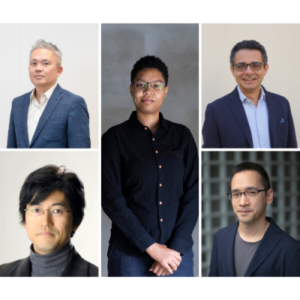Ryota Kanai is the founder & CEO of Araya, Inc. After graduating from the Faculty of Science at Kyoto University in 2000, he received his PhD (Cum Laude) in 2005 from Utrecht University in the Netherlands, where he studied human visual information processing mechanisms. After working as a researcher at California Institute of Technology in the U.S. and University College London in the U.K., and as a JST PRESTO researcher and Associate Professor of Cognitive Neuroscience at the University of Sussex in the U.K., he founded Araya, Inc. and worked full time there since 2015. He is engaged in research on the principles of consciousness in the brain and the implementation of consciousness in AI through the fusion of neuroscience and information theory. He has been also working on the practical application of AI and neuroscience in industry. He has received many awards, including the Young Scientist Award from the Ministry of Education, Culture, Sports, Science and Technology, the JEITA Venture Award (2020), the ET/IoT Technology Award (2019) among others as Araya Inc. From 2020, he is working on the practical application of brain-machine interface as a project manager of the Moonshot Project in the Cabinet Office. Vittorio Loreto, PhD, is a Full Professor of Physics at Sapienza University in Rome and the Sony Computer Science Laboratories (CSL) director in Paris. He recently founded Sony CSL in Rome. His research activity focuses on complexity science and its interdisciplinary applications. Over the past years, he has been active in several fields, from granular media to complexity and information theory, from social dynamics to sustainability. His recent interests focus on unfolding the dynamics of creativity, novelties, and innovation. The key to this endeavour is to grasp the structure and dynamics of the “space of possibilities” to develop solid mathematical modelling of how human and artificial systems – biological, technological, social – explore the new at the individual and collective levels. This knowledge can be helpful to conceive the next generation of Artificial Intelligent algorithms able to cope with the occurrence of novelties, bridging, in this way, the gap between inference and unexpected events. An important application of all this is related to the Sustainable Development Goals (SDG) and how humanity can conceive new sustainable solutions to long-standing challenges. Through the newly founded CSL Rome, I’m addressing these challenges in the relevant areas of sustainable cities and information and social dialogue. Jun Rekimoto received his Ph.D. in Information Science from Tokyo Institute of Technology in 1996. Since 1994 he has worked for Sony Computer Science Laboratories (Sony CSL). In 1999 he formed and directed the Interaction Laboratory within Sony CSL. Since 2007 he has been a professor in the Interfaculty Initiative in Information Studies at The University of Tokyo. Since 2011 he also has been Deputy Director of Sony CSL. Rekimoto’s research interests include human-computer interaction, computer augmented environments, human augmentation, and human-AI-integration. He invented various innovative interactive systems and sensing technologies, including NaviCam (a hand-held AR system), Pick-and-Drop (a direct-manipulation technique for inter-appliance computing), CyberCode (the world’s first marker-based AR system), Augmented Surfaces, HoloWall, and SmartSkin (two earliest representations of multi-touch systems). He is a member of the ACM SIGCHI Academy, is very widely published and won numerous research and design awards for his research. Lana Sinapayen is Artificial Life and Artificial Intelligence researcher at Sony Computer Science Laboratories in Japan. She specialises in predictive coding (the role of prediction in intelligence), artificial perception (sensory illusions in neural networks), and measures of complexity. She has a keen interest in all forms of intelligence, especially the unexpected ones. She is an Associate Editor for the Journal of Artificial Life and is involved in outreach and equity for the International Society for Artificial Life. She is also a member of the Early Career Advisory Group for the eLife Journal, and is currently working on a web platform for collaborative open science called “Mimosa”. Olaf Witkowski is the founding director of Cross Labs, a research institute based in Kyoto that focuses on the fundamental principles of natural and artificial intelligence, connecting research in academia and the industry. He also leads projects as an executive officer at AI company Cross Compass Ltd., a lecturer at the University of Tokyo, and a researcher at the Tokyo Institute of Technology. He is also the vice president of the International Society for Artificial Life, and recently co-founded ALife Japan.


